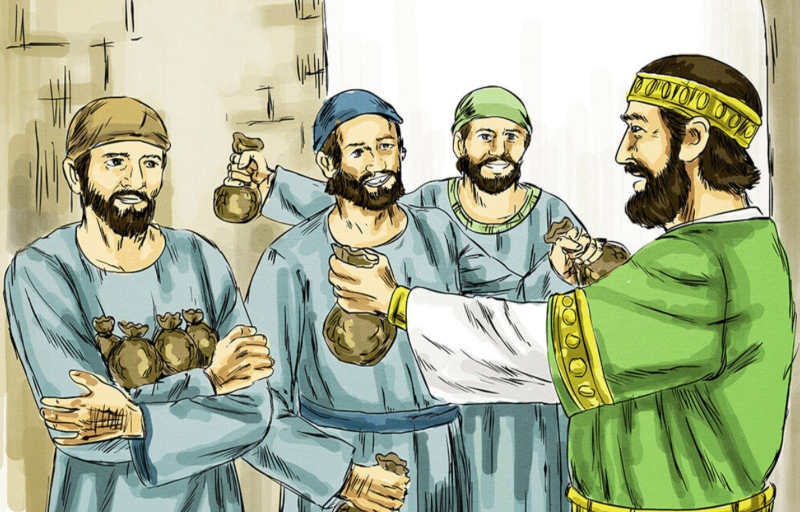Radical parables from Luke: 1. The minas
There is both a relaxing and a radical read here - and the trick is to find the challenge and listen to what Jesus has to say.
A new series focusing on parables in Luke, by Terry Young

You can read this parable here, or listen to it here (1:30 in).
How do you think Jesus taught? How was this parable (Matthew 25:14-30; Luke 19:11-27) captured by the gospel writers who recorded it in a completely different language? As Luke tells it he provides a segue after Jesus encounters Zacchaeus ahead of entering Jerusalem. Matthew is also looking to the future, much further into the future, and Jesus is already in Jerusalem.
If you watch good speakers for children and youth at church, you’ll see they have routines that last 3-5 minutes each – song, trick, story, quiz – and they mix and match them as they go along. Sometimes you’ll catch their eye at just the right moment and realise they are deciding on the fly what to do next. I sense something similar as Jesus extemporises on themes, each version of a core idea being adapted to suit the context.
Coming away from Zacchaeus and his wealth, Luke’s story emphasises the whirl of making money, with a servant who is wildly more productive than the rest. Heading into Jerusalem, Luke’s version also has an awkward streak of rejection. In Matthew, both committed workers are equally productive and double the stake they were given, but they get different amounts in the first place. Both versions of the parable reflect serious inequalities in business and in life.
If you go online for teaching and video clips, you’ll find that the word ‘talent,’ used to describe the gold in Matthew, has gleefully subverted the radical intent of the message: Jesus wants you to do your best with your talent! Your money and lifestyle are up to you: just sing in the choir or help your neighbour across the road with those strong arms and long legs of yours. Note that, online often underplays the differences between what the servants got and what they delivered, too.
Whatever your outlook, there is a relaxing and a radical way to read. If you are doing well, you can see how Jesus captures variation: no sense in fighting the market. You can enjoy all that is coming without a care in the world and rail against those freeloaders, too!
By contrast you may struggle with the parable’s inequality of opportunity, ability, and even the unequal redistribution at the end. However, there’s a relaxing read for you, too, if you want it. Why not focus on the irksome servant who does nothing and does so with intent? This character appears in both versions and provides a simple gospel message that is clearly aimed at other people.
Whatever your politics and success in life, there is a radical read for you that is just as shocking as the original was to its most perceptive hearers. And there is a relaxing read if you don’t really want to listen. Parables are clever, that way.
I’m intrigued by how close the productivity of Luke’s two servants (out of 10) comes to Pareto (the rule that says 20 per cent of clients yield 80 per cent of sales). Pareto is reflected in how giving varies at church (20 per cent of the givers probably provide 80 per cent of the budget). At an individual level, it also works: I’m wildly more productive at my best than at my worst. Because of physical impairment, I’m not worth half the minimum wage as a waiter but I can command good returns for the way I think. In the software industry, there are even team structures designed around super-coders who are crazily fast (at coding). That’s the relaxing read for me: it’s fascinating and it connects up other pieces of my life.
The radical read for me is that the servants are rewarded with more responsibility. At this stage in life, I’m looking for a gentle run in to an active retirement, with interesting projects, comfortable lifestyle, more reading, writing and other hobbies. As I’ve gotten involved with Christians around the world recently, I’ve discovered places where a little business expertise could make a big difference. At times, the need seems overwhelming. But the active servants weren’t overwhelmed: they got on with it and ultimately took on even more.
I don’t know what your relaxing read is, or how the radical read runs for you, but the trick is to find the challenge and listen to what Jesus has to say.
Does this mean that parables say whatever you hope they won’t? The idea of getting out of your comfort zone has become such a cliché that we forget we have skills and feelings that fulfil us in the right situations: some comfort zones are there for a reason. When we are in the right place, even when we are working hardest, we can be happiest. Don’t forget, the master selects the servants for the task – in both versions. You can expect your radical read to be something you can do well at.
But it is easy to discount the financial implications of this parable, too. We are the most affluent generation that has ever existed, and we live in one of the most affluent places on earth. It really does matter that we recognise that we have been given all we have, that our resources have incredible potential for growth, and that we will have to explain what we did with it all, one day.
Image | Arabs for Christ | FreeBibleimages.org
Professor Terry Young is an author and member of a Baptist church. He set up Datchet Consulting which combines his experience in industry and academia
Do you have a view? Share your thoughts via our letters' page.
Baptist Times, 09/07/2021